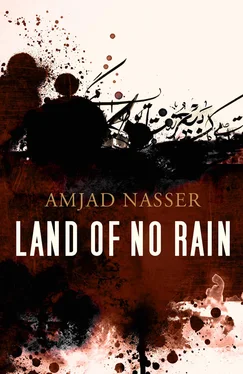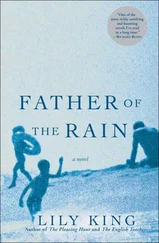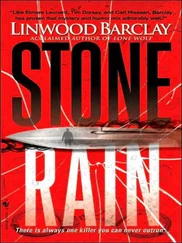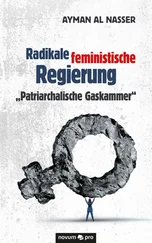Some people suspected that your friend Mahmoud had been a plant. You hadn’t suspected him. You knew how he tended to seek the limelight, to stand out and compete. But you didn’t suspect him. You defended him as much as you could. You offered arguments and evidence in his favour, such as the fact that Mahmoud knew about the poultry farm where you were hiding before you escaped abroad. If he had been a plant he would have given you away. Those who suspected Mahmoud told you this wasn’t proof. It could have been the opposite — to give you that impression, while he went on working for them abroad. You remembered that argument about Mahmoud at one of the coffee sessions in the NSA, when the interrogators referred to the apartment that you’d lived in briefly, in the City Overlooking the Sea, and the weapons that were in it and the maps for the operation in which they stormed the Hamiyan embassy in some Asian capital. They described the apartment in detail and its location in the maze of lanes, which floor it was on, what the door handle was made of, the number of rooms, and the colour of the curtains. You remembered the man in charge of ‘external operations’ in the Organisation, who had put you up in that apartment. You had a fleeting memory of meeting him in a local coffee shop. You remembered his white face with sharp features and blondish hair, but when he laughed, for whatever reason you don’t now recall, you could see his decaying teeth. While one of the young interrogators was talking about the apartment, you were thinking about how the external operations boss had always avoided laughing, in fact had almost refrained from smiling, probably because of his teeth. You thought to yourself that he must have had a complex about them. You have your own complex — you have a slight squint in your left eye, so you can’t look straight at the person you’re talking to. You’ve devised a studied turn of the head, so that both your eyes are directed at the person. You’ve tested the manoeuvre dozens of times in front of the mirror until you’ve mastered it. Your feelings about your cross-eyes only changed when the woman you loved said how fetching they were. Except for Mahmoud, you don’t remember anyone visiting you in the temporary apartment. Oh yes, you do. There was that girl you met in some bar in the city. Mahmoud was with you too. You don’t know how you ended up walking into that bar. You wanted a drink and you went into more than one bar in an area that was almost deserted because of the war. You had a drink here and a drink there. In that dimly lit bar, which reminded both of you of one you used to frequent in Hamiya, you found some girls smoking sullenly at the wooden counter, as dark as the bar itself. You don’t remember how many there were, four or five. There were two down-at-heel men drinking and smoking, pensively, as though in another world. When you went into the bar — you were two tall young men, one with long hair and a droopy moustache, the other with short hair and a trimmed moustache — a tremor ran through the dark-skinned girls. You ordered beer. You wanted to round off your bar crawl, the first you’d had in this city, with a cold beer. You sat at a wooden table with long benches along either side, rather like a school desk. Two women came up flirtatiously and asked to join you for a drink. You didn’t object. The one sitting next to you was older than you. In her thirties, you guessed. She could tell from your strong accent that you were a foreigner. She asked you where you were from, and you told her. That was your first mistake, or rather the second, because for security reasons your instructions were to avoid dubious contacts such as these. Out of drunkenness or desire, or both, you took her back to that apartment and slept with her. You’re almost smiling to yourself now as you remember how clever she was at pretending to be aroused and enjoying it, which was convincing at the time. You gave her some money and she left. That was your third mistake. Was it her? You thought about it, but no. She hadn’t sought you out. It was you who’d staggered into that dark bar. You’re no longer interested in who the informer was. You had nothing to do with the embassy-storming operation. For a start you weren’t close to the external operations department. It’s true that, like others, you underwent military training, but you didn’t work in the military wing. Your work in the Organisation was in the public relations and mobilisation department. When the external operations boss put you up in that apartment, it was at least a year after the embassy operation and its aftermath. The aim of the operation was apparently not to kill anyone but only to hold the ambassador hostage and exchange him for some prisoners from the Organisation. No one knows exactly who opened fire first: the ambassador’s bodyguards or one of the gunmen. Whoever had fired the first shot, the operation ended in a bloodbath. The ambassador, two of his bodyguards and three of the gunmen were killed. The support team was arrested but they did not stay long in prison because the external operations department of the Organisation, in collusion with a friendly country, abducted the ambassador of the Asian country in the capital of that country, and he was exchanged for the support team. You told them you had nothing to do with the operation, and the one who seemed to have the highest rank said they knew that, but they wanted to hear your version of it. He also said it was a procedural matter because all the sentences had been dropped. It was just a matter of closing the files! You told him that the external operations chief in the Organisation had disappeared while crossing the border of a state sympathetic towards you, and there was no trace of him. In the tone of someone who knows everything, he said they knew that and it had happened ten years ago. All you could do was ask him, with a trace of sarcasm, why he didn’t ask the secretary-general of the Organisation, who had returned to the country before you. The officer who seemed to be the most senior of the three concurred. ‘We’ve already asked him,’ he said, in the same sarcastic tone. ‘In fact we’ve asked all your comrades who’ve returned.’
* * *
I am Younis al-Khattat, and the man who has returned is me twenty years ago. I’d been waiting for ages for the opportunity that arose that night when we got talking, on the balcony of our house, amid bouts of coughing and sweating that made me feel sorry for him, though I suppressed my sympathy. I didn’t tell him a story as he’d expected. I spoke after he’d finished telling his own story, about the other man who had the same name as him and who practised the same profession. He wanted that story to be a metaphor for, or a counterpart to, my story about him. But he chose the wrong beginning with that story, which struck me as a little feeble, the way he invented someone who happened to share his pseudonym and of whose existence he wasn’t previously aware. Besides, knowing that the other guy existed didn’t change the course of his life. It was just a random coincidence of the kind that keeps happening to people without becoming a pattern or amounting to anything of consequence. I told him that his story was not enough to say that things were quits. I made fun of the poems in which he mourned his father and mother, and those in which he alluded to Roula. I said, ‘Which pavement were you hanging around on when your father was found dead in his studio, with a cigarette butt in the left corner of his mouth? In which bar or café were you boozing or sipping a cup of coffee while the cancer ate away at your mother in Hamiya’s public hospital?’ I also said that no words, however remorseful or apologetic, could make up for the way his mother had gazed westward, the direction she thought had swallowed him up for ever. I also told him that Roula had not betrayed him and Khalaf had not deceived him. I reminded him of Muhsin’s suicide. I told him that comrade Hanan had died, that Hala had married a businessman and Hasib had disappeared. I told him that Tom Thumb was the head of a smuggling gang and that Salman, his first poetry teacher, had become an evangelical preacher who toured the country towns and villages. I mentioned names that surprised him and others that he remembered straight away. I showed him a toughness that he wasn’t expecting. I played devil’s advocate with him. He had to hear a voice other than the voices of his brothers and sisters saying how much they had missed him, although they had coped in his absence. Their reminiscences and hearty laughs were all genuine but it’s also true that life here had moved on, detached from him, without the need for his existence, because life doesn’t wait for anyone and it doesn’t stop when one person gets off. This is a simple fact known to the ignorant and the learned alike. I’m amazed how it escaped him. Roula waited as long as she could. Men were courting her, men who wanted a wife or companion, but she kept turning them down. She offered many excuses and reasons, some of which were convincing and others less so. Khalaf stood by her throughout. He did not hide his relationship with his fugitive friend. He did not dissociate himself from him, although that was not easy for a security man in Hamiya.
Читать дальше












